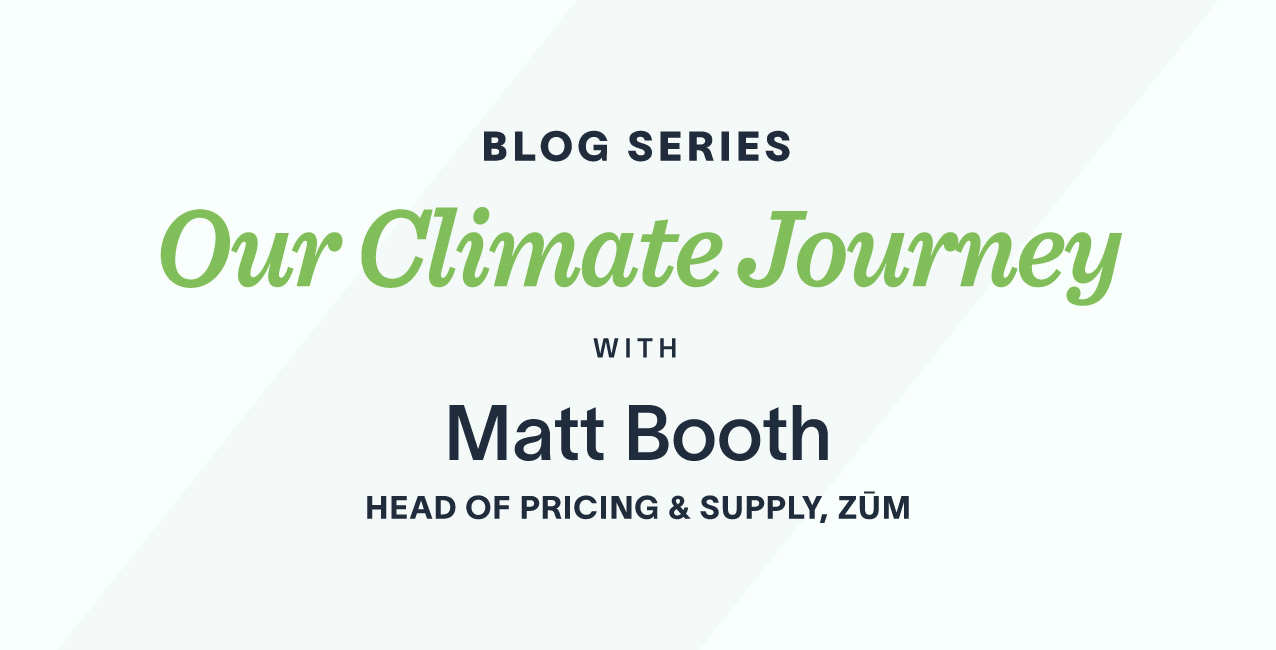
Our Climate Journey with Matt Booth

“To me, there are three pillars of sustainability: economic, environmental, and social. It helps me to think about each of these pillars in my work, and how I’m contributing, even in a small way, to building a better future.”
Matt Booth
Head of Pricing & Supply
As one of the longest tenured employees at Zūm, Matt’s role goes beyond his 15 years as a leader in inventory management, vehicle pricing and procurement, and fleet management. Matt cultivates and manages strong relationships with Original Equipment Manufacturers (OEMs) and bus dealers, streamlining the vehicle procurement process. Matt also leads the charge for Zūms Real Estate department, and is a dependable, go-to resource for his fellow employees.

At Zum, we’re revolutionizing student transportation in order to build a green, sustainable future. What does sustainability mean to you?
To me, there are three pillars of sustainability: economic, environmental, and social. It helps me to think about each of these pillars in my work, and how I’m contributing, even in a small way, to building a better future.
First, economic. At Zum, I’m in charge of procurement—purchasing things like assets, items, and equipment. Most notably, that means our school buses. I try and bring down our costs, because if we’re able to save money on our bus fleet, we can pass those savings on to our school district customers. That means less money out of pocket for schools, and taxpayers, which is a good thing, because that money can be spent on students and classrooms instead. To me, that’s economic sustainability.
Second, environmental. Yes, I lead our procurement of traditional internal combustion engine (ICE) buses, but I also work very hard to maximize our fleet efficiency by purchasing smaller vehicles like vans and SUVs, rather than full buses, and minimize waste by combining buses that don’t have full ridership. That means fewer buses on the road, and less pollution. And my counterparts are also working hard to replace our entire fleet with electric buses, which is incredibly exciting, and will really make an impact.
And third, there’s social sustainability. That means buying the right buses for the right schools and the right students, making sure special needs students have the right equipment on board to give them the best experience possible, and always keeping our children, and the families and schools we serve, top of mind.
Together, all three of these things help us build a more sustainable future.

Climate change is the single greatest threat to our way of life, but it can sometimes feel abstract, far away, a problem for another time. How has climate change affected you personally?
I grew up in Michigan, the Great Lakes State, and as a kid, I always used to go with my family to Lake Huron. I loved the natural beauty of the area, it’s something I think about often. But climate change has really done a number on my home state—the water level in Lake Huron continues to drop, and the ecosystem is so different now.
I really like being outdoors, whether it’s hiking, or camping, or skiing, and I believe firmly that we need to protect our natural resources. So I hate seeing when our environment is ruined by pollution, or changing water levels, or wildfires. (I have family in Montana, too, and their communities are consistently ravaged by fires. It’s especially hard in Michigan, where I have so many fond memories.
So our family does what we can to limit waste—lower energy consumption, share rides, use fewer cars on the road. It’s not much, but if everyone thought like that, it would make a big difference.

What can Zum do to be a leader in sustainability, to spearhead the charge in the fight against climate change?
Even in my role, there’s room to improve Zum’s environmental impact. For instance, I’m constantly evaluating whether we should use propane or gasoline-powered vehicles instead of traditional diesel buses, because they’re cleaner-burning and less environmentally intensive. And like I mentioned, if we have, say, two buses with less than 50% ridership, we try and combine those buses and routes, and retire the other bus so that there are fewer vehicles on the road and less pollution in the air.
Our biggest impact, I think, though, will be our transition to electric buses. My colleagues and friends, Pallav Prakash and Pawan Kumar, are spearheading that effort, and I’m glad just to be part of the project—because he’s replacing the ICE buses that I originally procured, which is great.